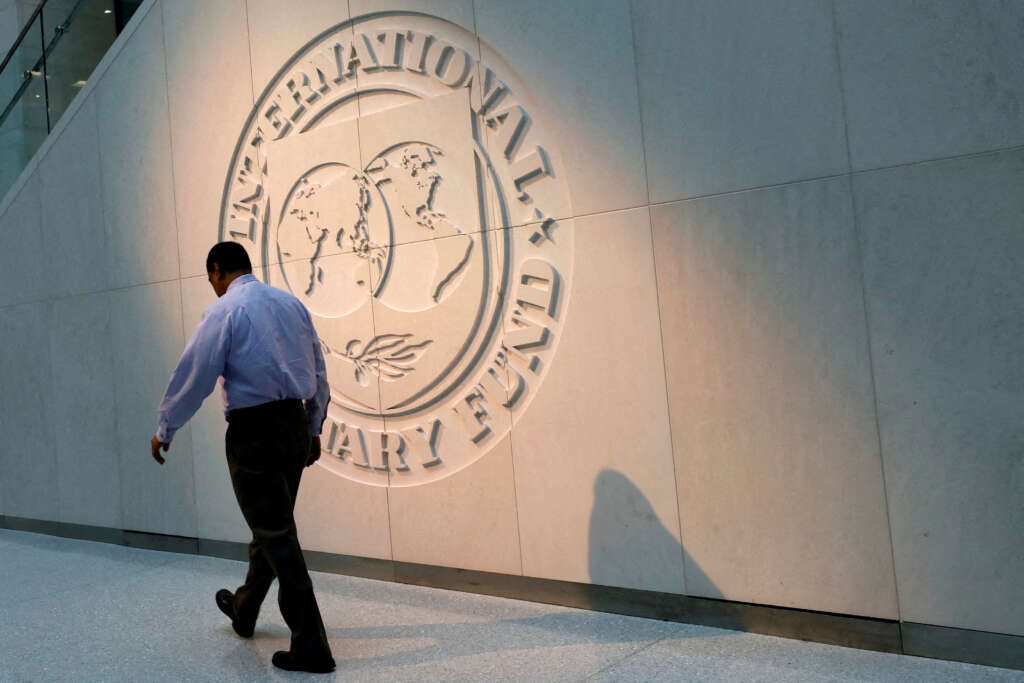
Banking stability worries go behind closed doors at IMF-World Bank meetings
By David Lawder and Andrea Shalal
WASHINGTON (Reuters) – Just a month after the biggest banking crisis in more than a decade, the world’s top economic and financial policymakers gathered in Washington and said surprisingly little about financial system stability – at least publicly.
With financial markets calmed by strong policy actions to stem the outflow of bank deposits, the International Monetary Fund and World Bank spring meetings were instead dominated by calls to keep up the fight against inflation, accelerate debt restructuring for poor countries and avoid geopolitical fragmentation of the global economy.
Some officials conveyed a sense that banking system safety was further down the priority list of global economic problems.
“One has managed to contain this crisis from spreading, so indeed there was not really so much focus during the IMF-World Bank meetings on this particular issue,” said European Commission Executive Vice President Valdis Dombrovskis.
“But it’s still something where we need to stay vigilant and address potential risks which may emerge in our financial system,” Dombrovskis told reporters. He added that the European Union’s banking system was stable, well capitalized with ample liquidity.
World Bank President David Malpass and the IMF’s Middle East director Jihad Azour both suggested their concerns about banking system strains were mostly in the context of potentially reducing the availability of credit for emerging markets at a time when rising interest rates already were causing capital outflows.
“As banking systems come under strain … there needs to be redoubled efforts to have capital flow to working capital,” Malpass told reporters on Thursday.
But other meeting participants said that behind closed doors there were more pointed questions about the potential for similar shocks like the failure of Silicon Valley Bank and the forced sale of global lender Credit Suisse.
INFLATION PRIORITY
The IMF opened the week by warning that a major new flare-up of banking system turmoil could slam global growth back to 1% this year, but urged priority for taming persistent inflation that has helped build interest rate stress on banks, including failed U.S. lenders Silicon Valley Bank and Signature Bank.
IMF Managing Director Kristalina Georgieva emphasized the need to overcome sticky inflation and low growth that threatens to last for years, warning that efforts to secure supply chains and rising geopolitical tensions could lead to a new Cold War, slowing growth further.
The steering committees of the IMF and the World Bank warned in general terms of the need for vigilance and encouraged regulators to step up supervision.
“Policymakers have taken swift actions to strengthen confidence in the banking system, which remains sound and resilient, supported by the reforms implemented after the 2008-09 global financial crisis,” the International Monetary and Financial Committee (IMFC) said in a chair’s statement.
But during the IMFC’s closed meeting, the possible spillovers from financial stability risks were a main topic, Ukrainian Finance Minister Serhiy Marchenko told Reuters.
He said IMFC members discussed three groups of countries: those with strong supervision and good tools to control inflation, those facing more risks to contain inflation, and those facing potential crisis emanating from inflation, recessions or bank runs.
“I think all the ministers of finance, all the central bankers are trying to be on one page,” Marchenko told Reuters in an interview. “What is necessary is that all policymakers should agree on specific measures they should take.”
A European Central Bank policymaker said the meetings made him more pessimistic about the financial stability outlook because the speed of rate hikes had sewn financial risk into banks’ asset bases, creating the potential for more SVB-like shocks.
“My sense is that some felt there were major risks with respect to credit contraction, commercial real estate, further potential for gravitation of deposits, underwater long-term bonds, and economic slowing that could trigger further financial sector ructions,” said Mark Sobel, a former IMF and U.S. Treasury official who attended the meetings.
“They also fretted about vulnerabilities in the non-bank financial sector,” said Sobel, who is U.S. chairman of the Official Monetary and Financial Institutions Forum think tank.
U.S. Treasury Secretary Janet Yellen said she was working to address financial system vulnerabilities and economic risks, but cautioned against too much negativism in the outlook.
A senior U.S. Treasury official said that Yellen’s discussions with counterparts broadly acknowledged that the financial system had weathered recent stresses but the search for pockets of leverage and risk needed to continue.
“Without being complacent, people are saying it seems like the system is working in a way it was intended, as the reforms were put in place following the global financial crisis,” the official said. “And so I think that was kind of the internal message and I’d say that was the external message.”
(Reporting by David Lawder and Andrea Shalal; additional reporting by Balazs Koranyi; Editing by Andrea Ricci)


